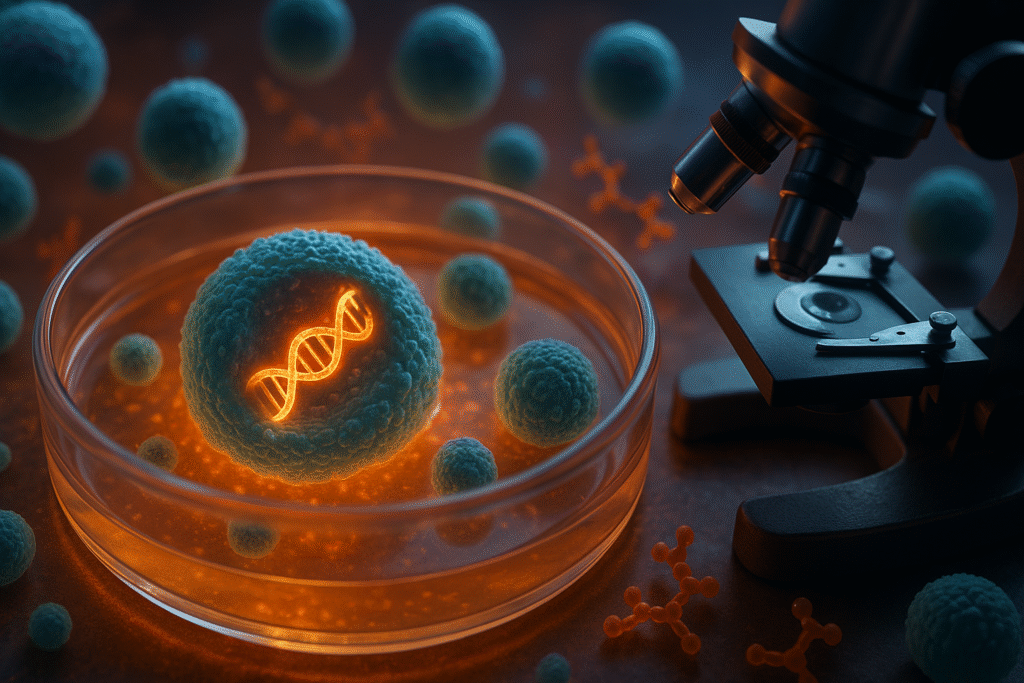In a major leap forward for biotechnology, Australian researchers have developed a biological AI system that can evolve molecules directly inside mammalian cells. This pioneering breakthrough blends biology and artificial intelligence in a way never seen before, promising to reshape drug discovery, gene therapy, and the development of precision medical tools.
The core idea is simple, yet revolutionary: create a living platform where AI isn’t just digital it’s biological. And with this comes the promise of treating genetic diseases more accurately and evolving molecules that could one day cure what we once thought incurable.
How the Biological AI System Works
At the heart of this innovation is a system that mimics natural evolution inside mammalian cells. Unlike traditional AI, which depends on silicon based hardware and pre-set algorithms, this biological AI system functions inside living tissue, learning and adapting in real time. Scientists essentially gave cells a “goal” to improve certain molecules and let nature, guided by engineered intelligence, do the rest.
In a conversation with Dr. Emma Liddell, one of the leading researchers behind this study, she explained. “Our system uses mammalian cells as mini factories and testbeds. These cells evolve specific molecular traits under real biological conditions, which makes the end results not just theoretical, but applicable to real human health scenarios.”
Gene Therapy Breakthrough
One of the first case studies conducted using the biological AI system involved improving a protein used in gene therapy for a rare neurological disorder. Traditionally, scientists used trial and error or computer models to adjust proteins a method that could take years. Using the biological AI system, researchers evolved a superior version of the protein in just weeks.
This rapid improvement dramatically increased the protein’s effectiveness in crossing the blood brain barrier, a major challenge in neuroscience. Clinical trials are being planned, and if successful, this could mark a historic milestone in treating diseases like Huntington’s or ALS.
The Future of AI in Biology
Dr. Kenneth Zhao, a synthetic biology expert from Stanford University, shared his thoughts. “The line between digital AI and living systems is becoming increasingly blurry. This biological AI system could change not only how we do science, but how we define intelligence itself. It’s like evolution 2.0 faster, smarter, and targeted.”
According to Dr. Zhao, future versions of this technology might allow real time molecular customization inside the human body. Imagine cancer therapies that evolve within the tumor, responding to resistance in real time this is no longer science fiction.
The Human Angle: A Parent’s Perspective
Kylie Morgan, a mother of a child with a rare genetic condition, was part of a public engagement session led by the research team. Her reaction was deeply moving. “For years, we’ve been told we have to wait for treatments that might come in decades. But this research feels alive like it’s racing alongside our kids’ lives. It gives me hope that science is no longer just looking at data, but truly learning and adapting for the people who need it most.”
This human connection is at the heart of why the biological AI system is so groundbreaking. It isn’t just another scientific tool it could be the foundation for a new era of personalized, intelligent medicine.
Hurdles and Ethical Considerations
While the technology holds immense promise, it also raises some ethical questions. Evolving molecules in mammalian cells blurs lines between natural and synthetic life. How do we regulate something that is both AI and biological? Could rogue molecular evolution create harmful variants?
Bioethicist Dr. Susan Delgado from the University of Melbourne noted. “We must develop guidelines that evolve with the technology. The potential for good is enormous, but so is the need for caution.” She emphasized the importance of transparency, especially when such systems are used in human related research or therapy.
The Biological AI System’s Long Term Potential
Let’s not underestimate the implications. This biological AI system could redefine, How we develop vaccines (especially adaptable to mutating viruses), How we design synthetic enzymes for climate friendly manufacturing, How we treat diseases with dynamic, evolving medicine, How we personalize healthcare based on a person’s biology
In many ways, it mirrors how evolution shaped life only now it’s happening in a lab, in weeks, and with human guided intelligence.
A New Era of Bio Intelligence Begins
As we stand at the frontier of merging machine learning with living cells, the biological AI system is more than just a tool it’s a symbol of how far we’ve come in understanding both technology and life. It offers faster, more accurate, and highly adaptable solutions for complex health challenges.
And more importantly, it places humanity at the center not just as users, but as partners in the biological evolution of intelligence.

